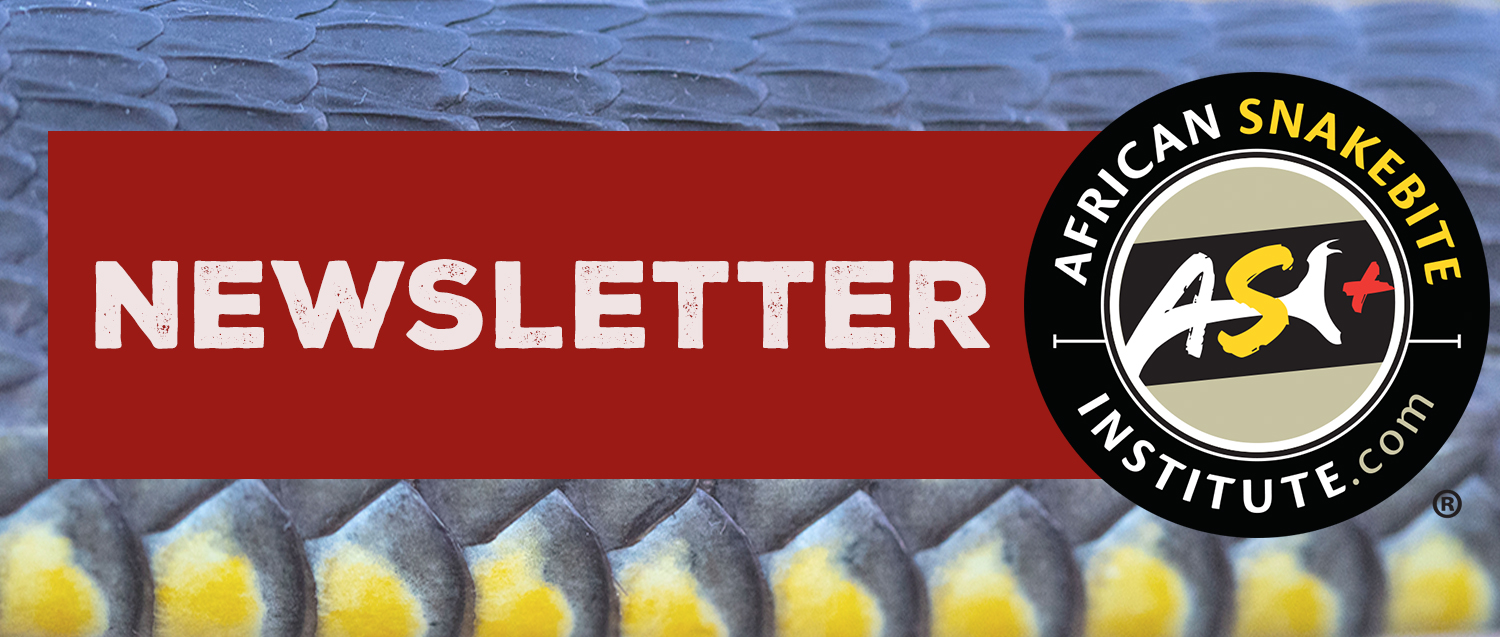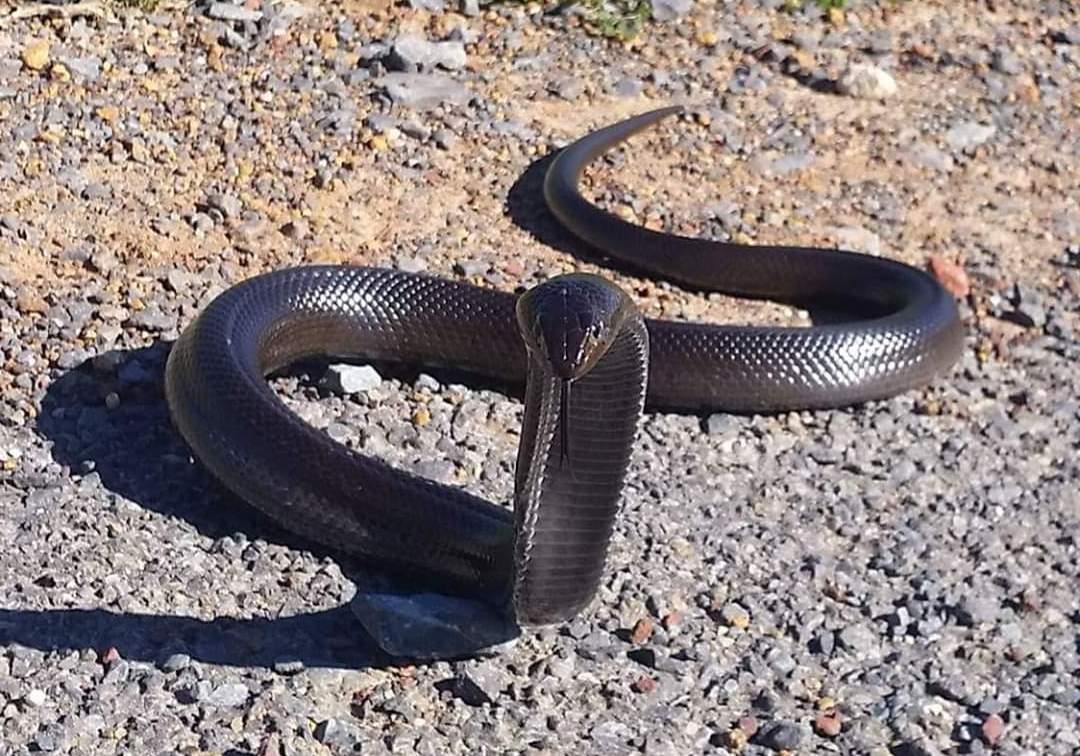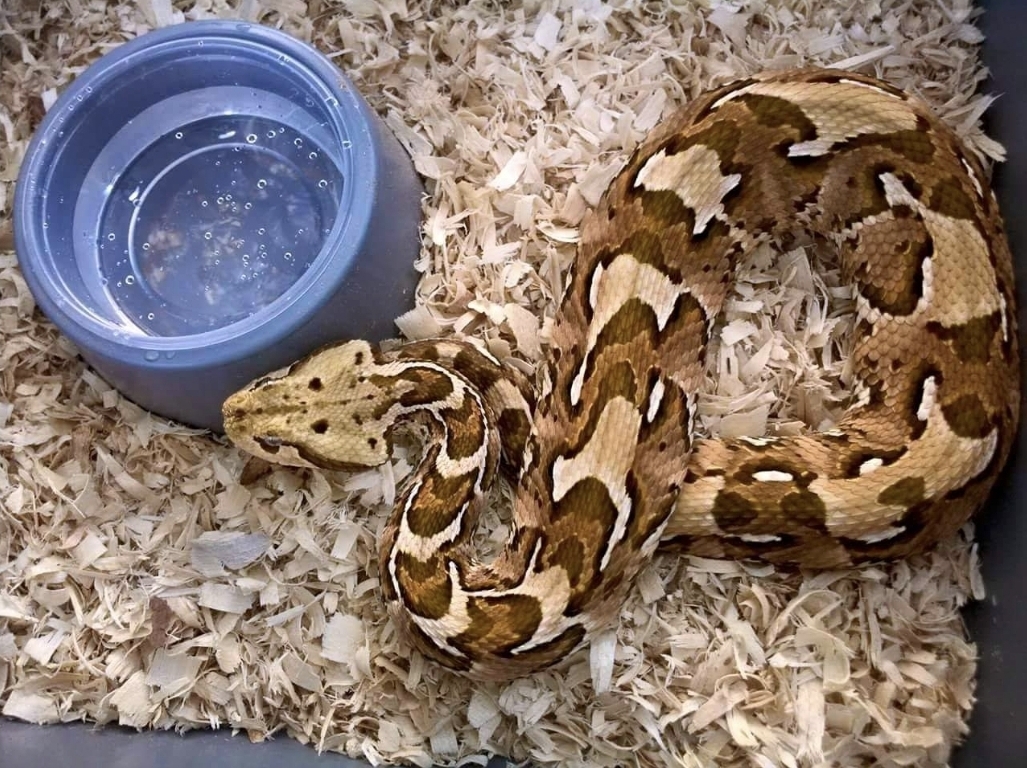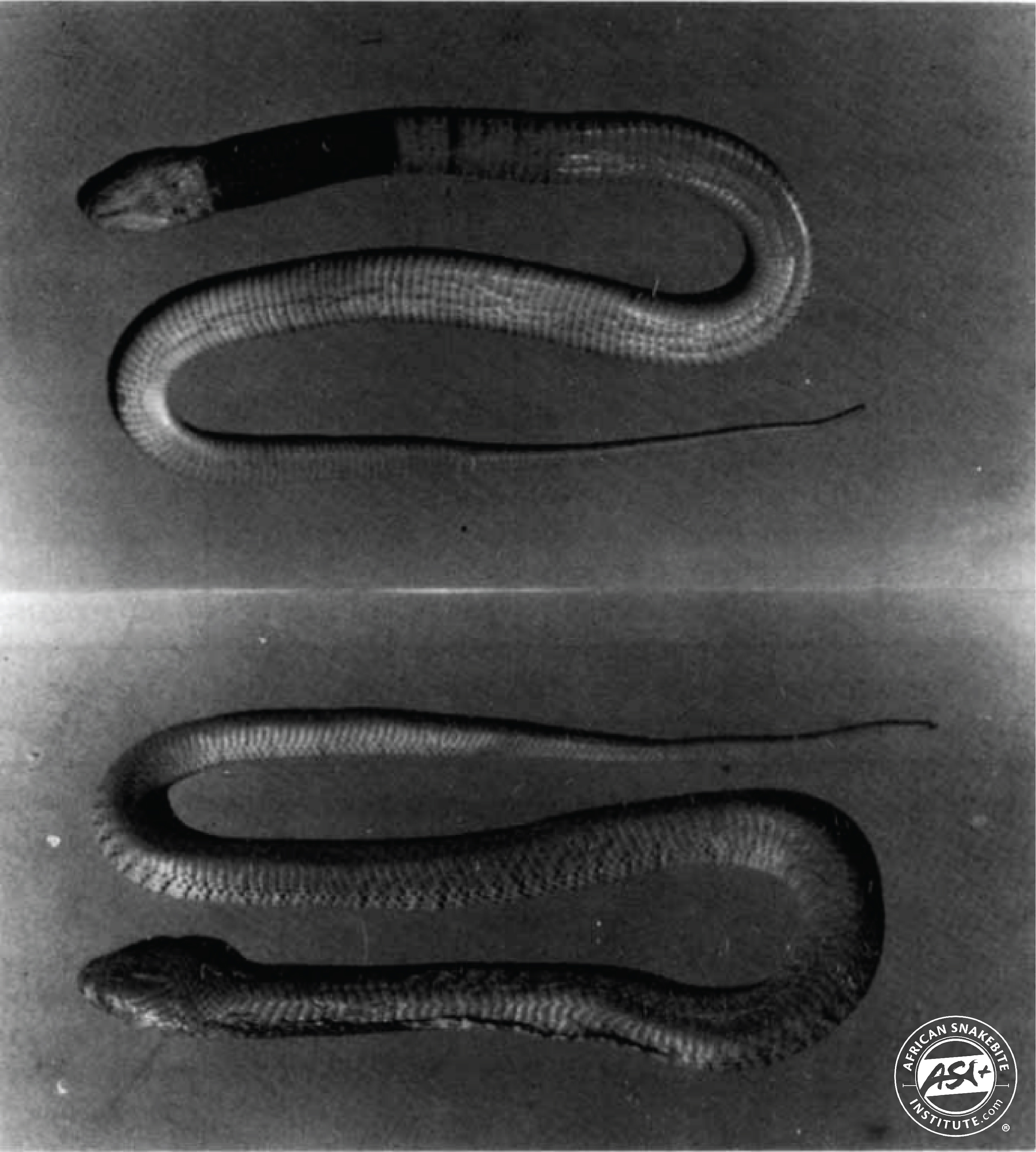|
You are receiving this email because you signed up for the monthly ASI Newsletter.
If you no longer wish to receive these emails you can unsubscribe here
|
 |
|
January 2024 - Can snakes crossbreed?
|
|
|
|
Farmers on the West Coast often talk about Mole Snakes (Pseudaspis cana) on their farms crossbreeding with Cape Cobras (Naja nivea) and that you get a Mole Snake that can raise the front third of its body off the ground and make hood and it is reportedly venomous! This is of course untrue, and Mole Snakes and Cape Cobras are as different as a dog from a cat. Mole Snakes and a selection of other snakes have been observed flattening the neck region to form a crude hood similar to cobras.
|
|
|
 |
|
An agitated Mole Snake crossing a road and displaying a crude hood. Photographer unknown.
|
|
|
|
Crossbreeding or hybridisation between closely related species can occur. Some well-known examples are mules – a cross between a horse and a donkey. Ligers have also become well-known more recently – a cross between a Lion and Tiger. In most cases, these crossbreeds are created by humans in captive settings, and generally, hybrid animals are sterile and cannot produce offspring. As the parents of hybrids are different species, the mixing of genetic material often causes mutations and malfunctions in the chromosomes. This usually leads to the production of infertile sex cells which causes infertility.
|
|
|
|
Limited Edition Titanium Tong
now in stock!
The ASI Limited Edition Titanium Tong is made with a 20mm diameter extra strong titanium shaft and our famous extra length upper jaw – perfect for removing large snakes.
Proudly made in South Africa.
Price R1490.00
|
| Order here |
|
|
|
|
 |
|
A Puff Adder cross Gaboon Adder hybrid - photo credit Andrew Godambe.
|
|
|
|
In southern Africa, we have two records of Puff Adders and Gaboon Adders crossbreeding in the wild. One from KwaZulu-Natal with the snake on display in the old Fitzsimons Snake Park in Durban and another from eastern Zimbabwe.
|
|
|
|
Africa's best-selling Snake Book!
Features of this book:
• Covers all essential aspects of snake biology and behaviour.
• Species descriptions are accompanied by full-colour photographs and
distribution maps.
• Simple icons make essential information available at a glance.
• A separate ‘key features’ box assists in quickly identifying species in the field.
• Chapters on classification and identification, keeping snakes, and the treatment of snakebite supplement the species accounts.
Price R520.00
|
| Order here |
|
|
|
Around Swakopmund in Namibia there have been observations of Peringuey’s Adder (Bitis peringueyi) mating with Horned Adders (Bitis caudalis). A strange looking little adder is also found in that area with patterns of a Horned Adder but without horns and with eyes on top of the head much like Peringuey’s Adder and is likely a hybrid between the two.
Large Adders like Gaboon Adders and Puff Adders are similar sizes and closely related. It would be unlikely for a small adder like a Berg Adder (Bitis atropos) to mate with a Puff Adder. It is almost impossible for unrelated snakes like Mole Snakes and Cape Cobras to breed as the reproductive organs are completely different. Additionally, Cape Cobras are well-known for eating Mole Snakes, so mating would be very difficult between a predator and prey.
|
|
|
|
In the Cobras there is one confirmed record of hybridisation between a Zebra Cobra (Naja n. nigricincta) and a Mozambique Spitting Cobra (Naja mossambica) in captivity. There are no confirmed hybridisation between these two snakes in the wild. Most cobras will predate on other snakes, including other cobra species and can even be cannibalistic on smaller cobras of the same species. There are no confirmed hybrids in mambas and even in cases where Black and Green Mambas have been kept together in captivity for a number of years, no mating has been observed.
|
 |
|
Hybridisation between a Zebra Cobra (Naja n. nigricincta) and a Mozambique Spitting Cobra (Naja mossambica) in captivity published in 1980.
|
|
|
|
The venom of hybrids has not been studied but is likely to be a mix or similar to the parent snakes’ venom. It is unlikely to be double as venomous and, in most instances, (Puff Adder x Gaboon Adder or Mozambique Spitting Cobra x Zebra Cobra) it is probable that the polyvalent antivenom would be effective.
Crossbreeding usually only happens between closely related species. The reproductive organs need to match or be similar for mating to occur. There also needs to be attraction, usually with pheromones and scent in snakes, and that will not usually work between two different species. Once they have mated, there is a high chance the sperm and egg will not fuse, and no offspring will be produced. Ony in very few cases can hybrids be created. Most anecdotal “hybrids” reported by the public are just colour variations of a species or a species displaying an unusual behaviour associated with another species. Hybrids in snakes are a rather rare occurrence in the wild.
|
|
|
|
Lightweight Snake Gaiters
The Lightweight Snake Gaiters have been tested against bites from the Puff Adder, Cape Cobra, Snouted Cobra and Black Mamba with no penetration during testing. Ideal for hikers, birders, fly-fishermen, geologists, bush-clearing teams, hunters and mountain biking.
Price R2450.00
|
| Order here |
|
|
|
|
|
PATERNOSTER
Snake Awareness, First Aid for Snakebite and Venomous Snake Handling Course
Date: Saturday 13 January 2024
Venue: St Augustus Anglican Church, Paternoster, Western Cape
|
|
|
| Book here |
|
|
|
WESTERN CAPE
KLAPMUTS
Snake Awareness, First Aid for Snakebite and Venomous Snake Handling Course
Date: Saturday 20 January 2024
Venue: Exotic Animal World, Klapmuts, Western Cape
|
|
|
| Book here |
|
|
|
WESTERN CAPE
KLAPMUTS
Venomous Snake Handling Bootcamp
Date: Sunday 21 January 2024
Venue: Exotic Animal World, Klapmuts, Western Cape
|
|
|
| Book here |
|
|
|
WESTERN CAPE
KLAPMUTS
Kids' Snake Awareness Course
Date: Sunday 21 January 2024
Venue: Exotic Animal World, Klapmuts, Western Cape
|
|
|
| Book here |
|
|
|
GAUTENG
Snake Awareness, First Aid for Snakebite and Venomous Snake Handling Course
Date: Saturday 27 January 2024
Venue: Cradle Moon Lakeside Lodge, Muldersdrift, Gauteng
|
|
|
| Book here |
|
|
|
GAUTENG
FREE
Kids' Snake Awareness Session
Date: Saturday 27 January 2024
Venue: Cradle Moon Lakeside Lodge, Muldersdrift, Gauteng
|
|
|
| Book here |
|
|
|
GAUTENG
Venomous Snake Handling Bootcamp
Date: Sunday 28 January 2024
Venue: Cradle Moon Lakeside Lodge, Muldersdrift, Gauteng
|
|
|
| Book here |
|
|
|
KwaZulu-Natal
DURBAN
Snake Awareness, First Aid for Snakebite and Venomous Snake Handling Course
Date: Saturday 27 January 2024
Venue: PheZulu Safari Park, Assagay
|
|
|
| Book here |
|
|
|
KwaZulu-Natal
DURBAN
Venomous Snake Handling Bootcamp
Date: Sunday 28 January 2024
Venue: PheZulu Safari Park, Assagay
|
|
|
| Book here |
|
|
|
|
|
|
|
Johan Marais is the author of various books on reptiles including the best-seller A Complete Guide to Snakes of Southern Africa. He is a popular public speaker and offers a variety of courses including Snake Awareness, Scorpion Awareness and Venomous Snake Handling. Johan is accredited by the International Society of Zoological Sciences (ISZS) and is a FGASA (Field Guides Association of Southern Africa) and SASTM (South African Society of Travel Medicine)-approved service provider. His courses are also accredited by the HPCSA (Health Professions Council of South Africa). Johan is a qualified instructor for the Emergency Care & Safety Institute in Oxygen Administration and Wilderness First Aid and a qualified Basic Life Support instructor.
|
 |
|
Copyright © 2023 African Snakebite Institute, All rights reserved.
Our mailing address is:
admin@asiorg.co.za
Unsubscribe from this list
|
|
|